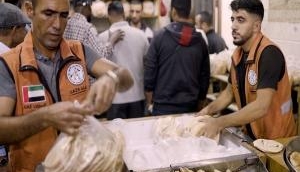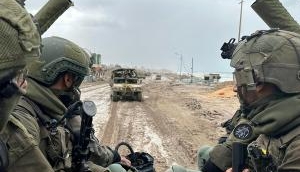As the battle for Mosul rages on, a look at the city before ISIS and after ISIS

Mosul is the second largest city in Iraq and is situated about 390 km north of Baghdad. Mosul used to be well connected by a four-lane expressway from Baghdad, which terminated further north at Zakhu, located on the Turkish-Iraq border.
But Mosul's greatest importance lies in the fact that it contains the largest urban conglomeration in the northern Arab Sunni heartland. It was the centre of nascent Iraqi nationalism and a city from which Iraqi military officers, posted there, successfully schemed and plotted the overthrow of the British-imposed Iraqi monarchy in 1958.
Also read - Even if Mosul is liberated, it won't be the end of Islamic State
During Saddam Hussein's time, he always kept a wary eye on political developments in Mosul and only his very trusted officers from the same tribal affiliation as his were posted to command the Mosul Brigade of the Iraqi army.
A rich cultural heritage
Mosul is an ancient city that has been continuously inhabited since Assyrian times. The historic site of Nineveh bears testimony to its rich cultural heritage and ancient civilization.
Since ancient times, Mosul has remained an important trade and commercial centre due its strategic location, with trade caravans passing through from Central Asia, Persia and India on to the Mediterranean ports and further afield to Europe.
As cotton was the main commodity of exchange, the word "muslin" is derived from the city's name.
In earlier days, it had the largest Christian population of Iraq; with churches, mosques, castles, monasteries and ancient historical sites that dotted the city. It would indeed be a tragedy of immense proportions, if ISIS with their skewed philosophy, were to have destroyed Mosul's ancient historical and cultural heritage. It would be a huge loss to mankind.
Mosul's fall
It is said that ISIS were able to capture Mosul fairly easily from the Iraqi army partly because the Shiite-led Baghdad government was least prepared and partly due to a large measure of Arab Sunni grievances that had accumulated over a period of time, ever since the overthrow of the Saddam regime by US military invasion of 2003 that deprived the Sunni ruling elite of all its military and governmental power.
The Sunnis in their northern Iraqi heartland have never reconciled to this loss of power and therefore were prepared to countenance the rule of the Sunni led ISIS, rather than the hated Shiites of the Baghdad government. Their continued resistance to Shiite led Baghdad government rule, is a direct consequence of the knowledge gained on what happened to the Sunni residents of Fallujah, Ramadi and Khalidiya; when these Sunni dominated cities were "liberated" by the Shiite militias of the Baghdad government. Most Sunni residents are still living in camps outside these cities.
The present offensive of the Iraqi army that as presently constituted is nearly 90% Shiite, supported by the Shiite militias, the US Special Forces, the Kurdish Peshmerga and Turkish forces conveniently stationed just north of Mosul; all have the makings of a sectarian bloodbath.
The US Air Force is also actively involved, both in bombing ISIS targets, as also in providing air cover for advancing troops. Heavy casualties with extensive loss of life and widespread damage to buildings in Mosul are expected as a result of the fighting. What will eventually remain of the city of Mosul is anybody's guess.
The battle for Mosul
It is interesting to compare how the western dominated international press is responding to the battles being waged in East Aleppo in Syria and Mosul in Iraq.
Both the cities are being besieged by government forces supported by foreign air power. It is said that East Aleppo has 2,50,000 civilians and about 8,000 insurgents. Mosul has one million people and about 5,000 ISIS fighters. If we read the coverage of the two battles, in Mosul it is the ISIS that is to be blamed for civilian casualties by using them as human shields and for preventing them from leaving. In East Aleppo, civilian casualties are innocent victims of "barbaric" Russian bombing.
No one mentions that Ramadi, an Iraqi city situated on the Euphrates, was 80% destroyed due to US bombing in 2015 and its Sunni residents still cannot go back to Ramadi because they fear the worst from a violent Shiite militia stationed there. Similarly Khalidiya, a city of 30,000, was completely devastated by US bombing and only four buildings remain intact.
There is genuine apprehension in the minds of the Syrian army, the Hezbollah and their Iranian allies that ISIS fighters would be "encouraged" to leave Mosul and head towards Syria to join in the fight against the Assad regime forces.
This apprehension was expressed by the Hezbollah leader Sayed Hassan Nasrallah when he publicly stated that the "US intends to repeat the Fallujah plot when they opened the way for ISIS fighters to escape towards the east to Syria". It is speculated that a way west of Mosul has been left "open" to allow the ISIS fighters to escape towards Raqqa in Syria.
What does the future hold?
However the real question that remains unanswered is who will administer Mosul as and when it is "liberated?" This presents the US with a dilemma to which no answer is as yet forthcoming.
To hand over Mosul to the Shiite-led Baghdad government means that it would eventually come under Iranian influence, since the Shiite clergy situated in Najaf and Kerbala that is the real power center behind the Baghdad government, has close and intimate links with their Iranian co-religionists. Not to do so, would mean that the essential unity of Iraq cannot be maintained. And in any case the city (Mosul) cannot be handed over to the Kurds, since there would be a violent Turkish reaction against it.
The US would be hard put to find an Arab Sunni leader who would be acceptable to all and who could nominally be designated as the governor of Mosul. The problem is would this new governor listen to the Baghdad government? Would he not be tempted to chart an independent course?
It has been the eternal US dilemma on how to deal with a third world, but an extremely oil rich Arab country like Iraq. A strong centralised Iraq has been detrimental to US' interests, whereas a weak fragmented Iraq is always likely to fall prey to the ambitions of its neighbors. The story of Iraq in recent times is also the story of US vacillation. No clear answers are available or forthcoming.
Edited by Aleesha Matharu
More in Catch - Iraqi special forces join forces to retake Mosul from Islamic State
Iraq: Military operation to liberate Mosul from Islamic State advances to first phase
First published: 26 October 2016, 7:59 IST





![BJP's Kapil Mishra recreates Shankar Mahadevan’s ‘Breathless’ song to highlight Delhi pollution [WATCH] BJP's Kapil Mishra recreates Shankar Mahadevan’s ‘Breathless’ song to highlight Delhi pollution [WATCH]](https://images.catchnews.com/upload/2022/11/03/kapil-mishra_240884_300x172.png)

![Anupam Kher shares pictures of his toned body on 67th birthday [MUST SEE] Anupam Kher shares pictures of his toned body on 67th birthday [MUST SEE]](https://images.catchnews.com/upload/2022/03/07/Anupam_kher_231145_300x172.jpg)






